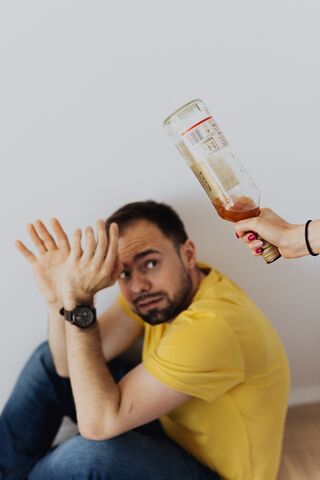Addiction
The Addiction of Narcissism
Substance abuse can be used as a defense or a coping mechanism.
Posted September 4, 2021 Reviewed by Vanessa Lancaster
Key points
- Narcissism and substance abuse have similar genetic predispositions.
- Those suffering at the hands of a narcissist are at risk for developing an addiction as a means of coping.
- Narcissists rarely get help for addictions because they do not believe they need it.
Like narcissism, addiction is an impairment. Substance abuse preys on one’s low self-esteem and some may be genetically predisposed. In 2008 the American Psychological Association described studies that showed at least half of an individual’s susceptibility to drug abuse and addiction could be linked to genetic factors. This finding was echoed in a 2021 Rutgers study that identified an interaction between genes and environmental factors. In 2016, a survey revealed that 21 million Americans, or one in seven, suffer from a substance abuse disorder, and only 10% seek treatment (Hafner).

Narcissism is a personality disorder that has complex origins. Both positive and negative personality traits are a combination of genetic and environmental influences. Underneath their bombastic exterior and projected self-esteem lies a fragile ego. Drug and alcohol abuse complicates narcissistic personality disorder and worsens side effects such as depression and anxiety. For both narcissists and addicts, the major casualty is the destruction of personal relationships.
Narcissism and addiction can be divided into two categories: the actual narcissist with the addiction and the victim of the narcissist who self-medicates through substance abuse.
The Narcissistic Addict
The narcissist themselves represent a type of addict. They are addicted to attention, drama, and chaos. They also have a deep hatred of the self which they cover with a highly extroverted persona. A narcissist will believe that they are prevalent and well-liked and deserve to be a leader without necessarily having the traits. They are deeply resentful of others who have what they desire yet believe people are very jealous of them. Narcissists are also incredibly talented at probing for attention and compliments, such as referring to themselves as ugly, fat, or stupid. Positive affirmations from others discounting the negativity will build up the narcissist’s insatiable need for attention and accolades.
At their very core, many narcissists hate themselves. They may marry, obtain a good job, and even have a family, but there is little peace behind the façade. To cope with the crippling self-doubt and self-hatred, many will turn to drugs and/or alcohol. Studies have shown links between narcissistic behavioral patterns and substance abuse issues (Calvert-Conley, 2020). Excessive drinking or drug use can cause a narcissist to spiral into destructive behavior, thus attracting attention and care from others. Drugs and alcohol can make them feel better about themselves or more control their perceived negative attributes by lifting their untreated depression and anxiety.
Above all, if a narcissist ever admits to an addiction or a destructive behavior yet continues engaging in the activity, it should be seen as a call for attention. Non-narcissists with addiction may have to hit rock-bottom before committing to a detox or recovery program, but they will use the time to force themselves to look in a mirror for the faults that need fixing.

Victim Addictions
Partners or family members may also suffer from addictions due to the mental abuse suffered at the narcissist's hands. Trauma feeds addiction and makes people susceptible to destructive behaviors. People tend to repeat behaviors and cycles, enabling the trauma to continue in new relationships and generations.
Adverse childhood experiences and military/combat PTSD are two areas of trauma with strong correlations to addiction (Calvert-Conley, 2018). A shocking 26% to 52% of people with substance abuse issues have also experienced post-traumatic stress disorder. One-third of combat veterans suffer from PTSD and addiction. Negative and disrupted attachment, neglect and maltreatment, high-conflict divorce, and abuse are examples of traumatic cycles during childhood. People seek to avoid these heartbreak variations but often find themselves deeply enmeshed in a similar adult situation. To cope with the abuse of living with a narcissistic abuser, the victim turns to self-medication through substance abuse.
Abuse is capable of disguising itself as love, and narcissists can be great attractors of victims. Those suffering from psychological abuse by a narcissist assume that this is love and seek ways to cope.
A two-pronged recovery program is necessary for victims of abuse: mental recovery and substance recovery. Not only will psychological help assist in physical recovery from addiction, but it will strengthen the victim's resolve to be free of the narcissist. The narcissist will never encourage their victim to get help and may go as far as taking them out of rehab or counseling. If the victim does get help and recovers, the narcissist will claim they supported their journey the entire time and begged them to get help for years. The narcissist will do whatever is necessary to regain control of the narrative and stay the long-suffering, supportive hero of the actual victim's story.

Getting Help
Rehab programs can be a powerful tool to break the mental hold narcissists have on their victims and sever the dependence on substances. For help or guidance, contact a therapist skilled in addiction and recovery.
References
American Psychological Association. (2008). Genes matter in addiction. www.APA.org
Calvert-Conley, R. (2019). The difference between physical and psychological addiction. revivedetoxlosangeles.com
Verbanas, P. (2021). Predisposition to addiction may be genetic. Rutgers Today.
Hafner, J. (2016). Surgeon general: 1 in 7 in USA will face substance addiction. USA Today.


